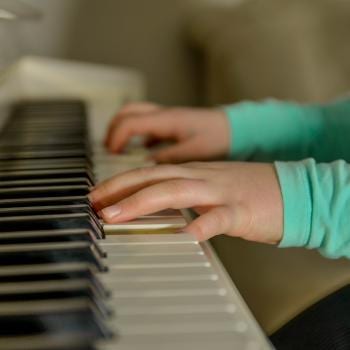One day not long ago, I was under a very large amount of stress. I had to clean the house and pack the car and get the kids and myself underway by a specific time, all on my own, without my partner there to help. My children weren’t being very helpful, either—both were upstairs on the computer—but then I’d been so busy I hadn’t really taken the time to get face-t0-face with them and explain what was going on. Not stopping for a few minutes to communicate directly with them was obviously a mistake, but as they say, hindsight is 20/20.
Anyway, while maneuvering into a tight space to get out some tools, already overheated and sweaty, I knocked over a tall vase of water my daughter, seven-year-old Sally, had left on the side of the table. I was annoyed with Sally for leaving the vase there, though it’s not like I’d talked to her about proper vase placement. Regardless, I called Sally downstairs and told her what had happened and told her to get some rags and clean up the water, and then I went back to maneuvering in the corner trying to get the toolbox open. It was clear that I was being short. Nevertheless, Sally began attempting to clean up the spill. But, I was still in that space and she was getting in my way while doing so, and finally I snapped at her to move.
I was stressed out and had reason to be so, but in being so short and in snapping at her, etc., I was taking it out on Sally, and that was very wrong of me. But you know what was really interesting here? Sally refused to take it. She knew I wasn’t treating her right—that I was being short with her and snapping at her—and that that was not okay. She went on a rant about how I was “stressing her out” and it wasn’t okay, and then she stormed off upstairs. And I just sat there, staring after her. Because my daughter has boundaries. My daughter has boundaries.
We talk a lot about how many of the things women are taught as girls set them up for abusive relationships later. They’re taught to be nice and not hurt anyone’s feelings, or that boys are mean to them because they “like” them, and so forth. There are additional ways in which children in general are set up for bad relationship patterns as adults. Many parents value obedience in children, or use emotional manipulation to get their children to do what they want. How we interact with our children—and how we encourage them to interact with us—sets patterns for the future.
I can speak to this on a personal level. I am married to a wonderful man, but I have spent much of our nearly decade of marriage unlearning bad relationship patterns I learned as a child. When my husband says anything at all critical of something I’ve done, I go into a full-blow flight or fight response, because as a child, those sorts of statements were followed up by emotional or physical punishment. I’m constantly afraid I’m in trouble. Similarly, the home I grew up in had a lot of indirect communication, and often substituted emotional manipulation for actually talking about things, and these are things I’ve had to root out of my communication toolbox over time. How we learn to interact with others as children has a significant impact on how we interact with others as adults.
After Sally stormed off, I gave it some time for both of us to cool down, and then I followed her upstairs. I sat down with her and apologized. I explained that I was stressed out, and that I had taken that out on her and I shouldn’t have. I told her I could use her help, and told her why I was stressed out. (She had known we were going to be leaving, I just don’t think she realized how much had to be done first, or that it was stressing me out.) And you know what? Sally immediately went to work helping me get ready, and we worked as a team.
This story may seem old hat to many of you. I got stressed out and started snapping at my daughter, she got mad and stormed off, the end. But you know what? As a child, I never would have dreamed of doing what she did that day. Blowing up at (or talking back to) your parent for any reason, in the home I grew up in, would land you in a whole heap of trouble. But Sally? She got mad and ranted at me with utterly no fear of retaliation. She knew she was in the right, and that she did not deserve to be treated like that. She knew that I ordinarily treat her well, that my actions at that moment were out of the ordinary, and that she had every right to object.
And to me, that is revolutionary.
But what about when she’s a teen? I get asked this a lot. Won’t encouraging behavior like this set me up for disaster later? I don’t think so. Sally is learning that she has a right to expect her needs to be respected, but she is also learning that we listen to her. If she has a problem with, say, a curfew, she will come to us to talk about it. There’s another piece too—namely, that it goes both ways. Consider that in the story above, after I apologized to Sally and explained why I was so stressed out, she offered to help out, and did so happily and willingly. This is typical. I let Sally have a say in the rules we set and the plans we make, and generally our negotiations over these things involve her taking into account her needs in a situation, and my needs, and looking for a solution that meets both. While I could be wrong, I fully expect her teen years to play out similarly. I actually think that going into her teen years with two-way lines of communication, listening, and respect already established will set all of us up well.
But this post isn’t about Sally’s teen years, it’s about the boundaries she has already begun to set, the reality that she is already learning to stand up for herself, and the importance of teaching children that they should be able to expect to be treated well (as well as how to tell the difference between good treatment and bad treatment, of course). I am hopeful that Sally’s ability to recognize bad treatment and object to it will take her far, and protect her from falling into potentially bad situations in the future. And that is beautiful.















